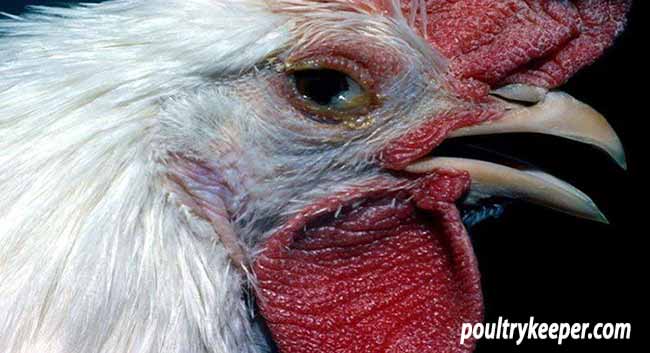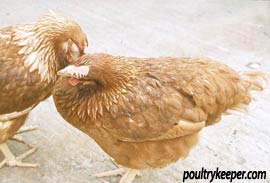I totally agree with you as to navigating this new BYC format
here is an article on respiratory disease that may help you out.
https://poultrykeeper.com/respiratory-problems/respiratory-disease-in-chickens/
Respiratory Disease in Chickens
Richard Jackson BVMs (Hons) MRCVS 16th February 2011
Respiratory Problems
O
ne of the most common veterinary complaints of backyard chickens is snicking, sneezing and coughing. Respiratory disease often presents itself with one or more birds sneezing / snicking. These birds can have a runny nose and foamy running eyes. In severe cases these birds can have swollen sinuses (presents as swelling around the eyes), stop eating and in extreme cases die.
There a number predisposing factors for respiratory disease in chickens: as with any animal stress can cause an underlying disease to show itself. This stress could be extremes of temperature and humidity, high stocking density, being transported, being taken to a poultry show and new animals being introduced to an existing/established flock.
If your bird does develop any of these signs it is worth consulting your vet as antibiotic treatment is usually advised. In general your vet will often advise that the entire group of birds should be treated. Usually medication is given in their water but in severely ill birds injections may be the best option.
Birds suffering with respiratory disease should always be isolated from the other healthy hens, given lots of TLC and be given veterinary attention where necessary.
Enrofloxacin (
Baytril) is an antibiotic that many bird owners are familiar with, your chicken may have been given some by a vet and it is widely talked about on different chicken forums and information sites. This antibiotic may not always be the drug of choice in all respiratory conditions and we would certainly advise you seek proper veterinary advice before your chickens are given any type of prescription medication.
There are a number of possible pathogens involved in respiratory disease in chickens. A simple blood test can determine which one(s) are the cause. It is often the case that more than one pathogen is involved, the most common ones are Mycoplasma Gallisepticum, Infectious Bronchitis, ART (AvianRhinoTracheitis virus) and ILT (Infectious LaryngoTracheitis virus).
Mycoplasma Gallisepticum.
Mycoplasma Gallisepticum: Is a type of bacteria which can cause respiratory disease in chickens and other poultry. It is often associated with swollen sinuses, sneezing and foamy watery eyes. In certain cases it can cause swollen joints and subsequently lameness. It can infect the oviduct thus altering egg shell colour and quality and thus it can be transferred via the egg to chicks.
Once infected a chicken is infected for life although clinical signs will regress with time and treatment but they are always liable to come back.
AvianRhinoTracheitis (ART)
ART is a pneumovirus which causes swollen heads (see the photo, right), swollen sinuses, sneezing and in severe cases nervous signs.
Infectious Bronchitis (IB)
Infectious Bronchitis (IB) is a coronavirus which causes sneezing, foamy eyes and swollen sinuses usually in young birds. However like Mycoplasma it can infect the oviduct again altering egg shell colour and quality but unlike Mycoplasma it doesn’t infect chicks via the egg. Severe IB infection in young female birds can permanently damage the oviduct causing it to permanently not carry the egg from the ovary to the vent so the eggs are laid internally. These eggs inside the bird are slowly absorbed but they provide an excellent food for bacteria so internal layers are vulnerable to get egg peritonitis. The eggs are often absorbed much more slowly than they are internally laid so they build up in the bird’s abdomen causing them to adopt a penguin like stance.
Infectious LaryngoTracheitis (ILT)
‘Penguin Stance’ of Egg Peritonitis
ILT is a herpes virus and causes similar respiratory signs. ILT often leads to a plug of blood and mucus which can block the birds trachea (windpipe) leading to the bird choking to death. This virus like Myoplasma never goes away and can come back during times of stress. Like other herpes viruses it is for life.
As many of you will notice the pathogens above are mostly viruses which will not respond to antibiotics. However these viruses often damage the respiratory system sufficiently to allow secondary bacteria such as E. coli and Pasteurella to cause infection and in severe cases blood poisoning.
Furthermore chickens have a unique respiratory system compared to us mammals. They have air sacs which are very thin and when viruses such as IB damage the protective cells of the trachea (windpipe) the birds can easily breath in bacteria which can then cross the air sacs into the abdomen to cause peritonitis.
The best way of preventing infection of your birds is to minimise stress, ensure the stocking density and ventilation are correct and that you buy in disease free birds from a reputable supplier which have been quarantined for at least 3 weeks (try not to buy from local markets).
If your birds are being stressed by bad weather or moulting etc you may want to consider giving them a course of multivitamins such as Amino Plus or a product such as Beryl’s Friendly Bacteria – a sort of “yakult” for birds. Both these products will give your birds a boost which will be invaluable to helping them towards a full recovery.
If you breed your own birds and you have any ongoing disease issues you can consider vaccination of your flock. The staff at Chicken Vet offer advice on a mini flock vaccination programme, for more information on any of these matters we have discussed please contact us.




